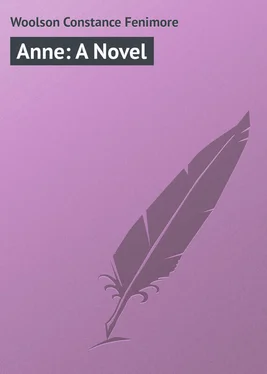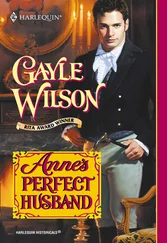Constance Woolson - Anne - A Novel
Здесь есть возможность читать онлайн «Constance Woolson - Anne - A Novel» — ознакомительный отрывок электронной книги совершенно бесплатно, а после прочтения отрывка купить полную версию. В некоторых случаях можно слушать аудио, скачать через торрент в формате fb2 и присутствует краткое содержание. Жанр: Классический детектив, foreign_detective, foreign_prose, на английском языке. Описание произведения, (предисловие) а так же отзывы посетителей доступны на портале библиотеки ЛибКат.
- Название:Anne: A Novel
- Автор:
- Жанр:
- Год:неизвестен
- ISBN:нет данных
- Рейтинг книги:5 / 5. Голосов: 1
-
Избранное:Добавить в избранное
- Отзывы:
-
Ваша оценка:
- 100
- 1
- 2
- 3
- 4
- 5
Anne: A Novel: краткое содержание, описание и аннотация
Предлагаем к чтению аннотацию, описание, краткое содержание или предисловие (зависит от того, что написал сам автор книги «Anne: A Novel»). Если вы не нашли необходимую информацию о книге — напишите в комментариях, мы постараемся отыскать её.
Anne: A Novel — читать онлайн ознакомительный отрывок
Ниже представлен текст книги, разбитый по страницам. Система сохранения места последней прочитанной страницы, позволяет с удобством читать онлайн бесплатно книгу «Anne: A Novel», без необходимости каждый раз заново искать на чём Вы остановились. Поставьте закладку, и сможете в любой момент перейти на страницу, на которой закончили чтение.
Интервал:
Закладка:
"It means mummery!" said Miss Lois, loudly and sternly.
Anne glanced toward her old friend, but stood her ground firmly. "I must take them," she said; "I promised I would do so as long as they were children, and under my care. When they are older they can choose for themselves."
"To whom did you make that promise, Anne Douglas?"
"To Père Michaux."
"And you call yourself a Protestant!"
"Yes; but I hope to keep a promise too, dear Miss Lois."
"Why was it ever made?"
"Père Michaux required it, and – father allowed it."
Miss Lois rubbed her forehead, settled her spectacles with her first and third fingers, shook her head briskly once or twice to see if they were firmly in place, and then went on with her knitting. What William Douglas allowed, how could she disallow?
Rast, standing by Anne's side putting on his fur gloves, showed no disposition to yield.
"Please do not come, Rast," said the girl again, laying her hand on his arm.
"I shall go to take care of you."
"It is not necessary; we have old Antoine and his dogs, and the boys are to have a sled of their own. We shall be at home before dark, I think, and if not, the moon to-night is full."
"But I shall go," said Rast.
"Nonsense!" said Miss Lois. "Of course you will not go; Anne is right. You romp and make mischief with those children always. Behave now, and you shall come back this evening, and Anne shall come too, and we will have apples and nuts and gingerbread, and Anne shall recite."
"Will you, Annet? I will yield if you promise."
"If I must, I must," said Anne, reluctantly.
"Go, then, proud maid; speed upon your errand. And in the mean time, Miss Lois, something fragrant and spicy in the way of a reward now would not come amiss, and then some music."
Among the possessions which Miss Lois had inherited from her aunt was a small piano. The elder Miss Hinsdale, sent into the world with an almost Italian love of music, found herself unable to repress it even in cold New England; turning it, therefore, into the channel of the few stunted psalms and hymns and spiritual songs of the day, she indulged it in a cramped fashion, like a full-flowing stream shut off and made to turn a mill. When the missionary spirit seized her in its fiery whirlwind, she bargained with it mentally that her piano should be included; she represented to the doubting elder that it would be an instrument of great power among the savages, and that even David himself accompanied the psalms with a well-stringed harp. The elder still doubted; he liked a tuning-fork; and besides, the money which Miss Priscilla would pay for the transportation of "the instrument" was greatly needed for boots for the young men. But as Miss Priscilla was a free agent, and quite determined, he finally decided, like many another leader, to allow what he could not prevent, and the piano came. It was a small, old-fashioned instrument, which had been kept in tune by Dr. Douglas, and through long years the inner life of Miss Lois, her hopes, aspirations, and disappointments, had found expression through its keys. It was a curious sight to see the old maid sitting at her piano alone on a stormy evening, the doors all closed, the shutters locked, no one stirring in the church-house save herself. Her playing was old-fashioned, her hands stiff; she could not improvise, and the range of the music she knew was small and narrow, yet unconsciously it served to her all the purposes of emotional expression. When she was sad, she played "China"; when she was hopeful, "Coronation." She made the bass heavy in dejection, and played the air in octaves when cheerful. She played only when she was entirely alone. The old piano was the only confidant of the hidden remains of youthful feeling buried in her heart.
Rast played on the piano and the violin in an untrained fashion of his own, and Anne sang; they often had small concerts in Miss Lois's parlor. But a greater entertainment lay in Anne's recitations. These were all from Shakspeare. Not in vain had the chaplain kept her tied to its pages year after year; she had learned, almost unconsciously, as it were, large portions of the immortal text by heart, and had formed her own ideals of the characters, who were to her real persons, although as different from flesh-and-blood people as are the phantoms of a dream. They were like spirits who came at her call, and lent her their personality; she could identify herself with them for the time being so completely, throw herself into the bodies and minds she had constructed for them so entirely, that the effect was startling, and all the more so because her conceptions of the characters were girlish and utterly different from those that have ruled the dramatic stage for generations. Her ideas of Juliet, of Ophelia, of Rosalind, and Cleopatra were her own, and she never varied them; the very earnestness of her personations made the effect all the more extraordinary. Dr. Gaston had never heard these recitations of his pupil; William Douglas had never heard them; either of these men could have corrected her errors and explained to her her mistakes. She herself thought them too trifling for their notice; it was only a way she had of amusing herself. Even Rast, her playmate, found it out by chance, coming upon her among the cedars one day when she was Ophelia, and overhearing her speak several lines before she saw him; he immediately constituted himself an audience of one, with, however, the peremptory manners of a throng, and demanded to hear all she knew. Poor Anne! the great plays of the world had been her fairy tales; she knew no others. She went through her personations timidly, the wild forest her background, the open air and blue Straits her scenery. The audience found fault, but, on the whole, enjoyed the performance, and demanded frequent repetitions. After a while Miss Lois was admitted into the secret, and disapproved, and was curious, and listened, and shook her head, but ended by liking the portraitures, which were in truth as fantastic as phantasmagoria. Miss Lois had never seen a play or read a novel in her life. For some time the forest continued Anne's theatre, and more than once Miss Lois had taken afternoon walks, for which her conscience troubled her: she could not decide whether it was right or wrong. But winter came, and gradually it grew into a habit that Anne should recite at the church-house now and then, the Indian servant who happened to be at that time the occupant of the kitchen being sent carefully away for the evening, in order that her eye should not be guiltily glued to the key-hole during the exciting visits of Ophelia and Juliet. Anne was always reluctant to give these recitations now that she had an audience. "Out in the woods," she said, "I had only the trees and the silence. I never thought of myself at all."
"But Miss Lois and I are as handsome as trees; and as to silence, we never say a word," replied Rast. "Come, Annet, you know you like it."
"Yes; in – in one way I do."
"Then let us take that way," said Rast.
CHAPTER IV
– "Sounding names as any on the page of history – Lake Winnipeg, Hudson Bay, Ottaway, and portages innumerable; Chipeways, Gens de Terre, Les Pilleurs, the Weepers, and the like. An immense, shaggy, but sincere country, adorned with chains of lakes and rivers, covered with snows, with hemlocks and fir-trees. There is a naturalness in this traveller, and an unpretendingness, as in a Canadian winter, where life is preserved through low temperature and frontier dangers by furs, and within a stout heart. He has truth and moderation worthy of the father of history, which belong only to an intimate experience; and he does not defer much to literature."
– Thoreau.Immediately after the early dinner the little cavalcade set out for the hermitage of Père Michaux, which was on an island of its own at some distance from the village island; to reach it they journeyed over the ice. The boys' sled went first, André riding, the other two drawing: they were to take turns. Then came old Antoine and his dogs, wise-looking, sedate creatures with wide-spread, awkward legs, big paws, and toes turned in. René and Lebeau were the leaders; they were dogs of age and character, and as they guided the sledge they also kept an eye to the younger dogs behind. The team was a local one; it was not employed in carrying the mails, but was used by the villagers when they crossed to the various islands, the fishing grounds, or the Indian villages on the mainland. Old Antoine walked behind with Anne by his side: she preferred to walk. Snugly ensconced in the sledge in a warm nest of furs was Tita, nothing visible of her small self save her dark eyes, which were, however, most of the time closed: here there was nothing to watch. The bells on the dogs sounded out merrily in the clear air: the boys had also adorned themselves with bells, and pranced along like colts. The sunshine was intensely bright, the blue heavens seemed full of its shafts, the ice below glittered in shining lines; on the north and south the dark evergreens of the mainland rose above the white, but toward the east and west the fields of ice extended unbroken over the edge of the horizon. Here they were smooth, covered with snow; there they were heaped in hummocks and ridges, huge blocks piled against each other, and frozen solid in that position where the wind and the current had met and fought. The atmosphere was cold, but so pure and still that breathing was easier than in many localities farther toward the south. There was no dampness, no strong raw wind; only the even cold. A feather thrown from a house-top would have dropped softly to the ground in a straight line, as drop one by one the broad leaves of the sycamore on still Indian summer days. The snow itself was dry; it had fallen at intervals during the winter, and made thicker and thicker the soft mantle that covered the water and land. When the flakes came down, the villagers always knew that it was warmer, for when the clouds were steel-bound, the snow could not fall.
Читать дальшеИнтервал:
Закладка:
Похожие книги на «Anne: A Novel»
Представляем Вашему вниманию похожие книги на «Anne: A Novel» списком для выбора. Мы отобрали схожую по названию и смыслу литературу в надежде предоставить читателям больше вариантов отыскать новые, интересные, ещё непрочитанные произведения.
Обсуждение, отзывы о книге «Anne: A Novel» и просто собственные мнения читателей. Оставьте ваши комментарии, напишите, что Вы думаете о произведении, его смысле или главных героях. Укажите что конкретно понравилось, а что нет, и почему Вы так считаете.












